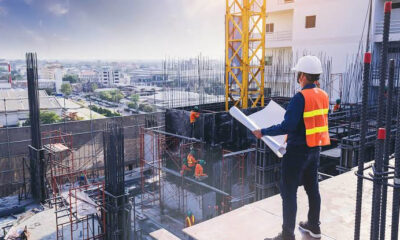News
Interim Budget: Hike IT Exemption, Lower Long Term Capital Gains Tax on Realty, Industry & Infrastructure Status, GST Rationalisation, Include Realty Demands

New Delhi, Jan 30, 2024: Policy impetus, tax breaks, fiscal support – demands real estate from Finance Minister Nirmala Sitharaman on her Interim Budget to be presented on Thursday, February 1, 2024. Among real estate sector’s demands include increasing Rs 2 lakh income tax rebate on home loan interest to at least Rs 5 lakh. This would stimulate housing market, especially in the affordable homes segment.
Policy measures to boost investments in the real estate sector is the key demand of the realty sector. Increasing the cap on affordable housing will enable larger number of homebuyers to reap the benefits of the affordable housing incentives, believe experts.
Industry stalwarts emphasize on the need of revising long-term capital gains tax on property. Lowering it to 10 per cent from the existing 20 per cent will incentivize real estate investments. Taking required measures to make REITs more attractive and GST rationalization also find place in the wish-list.
Among other demands of the real estate sector include simplified regulatory processes and single-window clearances.
Excerpts of realty bigwigs’ budget expectations –


Kushagr Ansal, Director, Ansal Housing
“The real estate sector is the sturdy growth pillar in the Indian economy, and eagerly anticipates the budget to fulfill its longstanding request for industry status. Developers are hopeful for reduced interest rates and tax incentives, serving as economic alleviation during crises.”


Rajesh K Saraf, MD, Axiom Landbase
“NITI Aayog’s forecast of the Indian real estate sector reaching a $1 trillion market size by 2030 highlights its long-term prospects. The sector looks to the government for intervention in reducing input costs, specifically for steel, cement, and fuel. We also request the government to consider reducing the GST rate on cement and initiatives to promote affordable housing through tax incentives.”


Surender Kaushik, MD, Aryan Realty Infratech
“With real estate contributing 6-8% to the GDP and employing over five crore people, expectations are high for the upcoming budget. Key proposals include a separate deduction for principal repayment, a redefined threshold for affordable housing, and increased carpet area limits. We also request changes in long-term capital gains taxation, exemptions to REIT investments, and introducing a single window clearance system to streamline approval processes.”
Vidush Arya, Head – Strategy, Orris Infrastructure
“We anticipate favorable norms aimed at lowering interest rates and introducing tax rebates, encouraging sustained development and investment. Additionally, we hope for increased budget allocation towards new infrastructural developments. This dual strategic focus aligns with the positive momentum already witnessed, further elevating the quality of life for the home buyers and investors.”


Ashwinder R Singh, CEO Residential, Bhartiya Urban
“The real estate scene had a defining moment in 2023, setting the stage for what’s expected to be an even more dynamic 2024. With a strong economy and potential adjustments in home loan interest rates, the sector anticipates a surge in demand. To align with the government’s vision of housing for everyone, crucial issues need attention. The upcoming budget is crucial, with the top wish being industry status for real estate. Key measures like simplified clearances, tax breaks, and GST adjustments are essential. There’s a call for a thoughtful plan for affordable housing, tapping into untapped potential and unmet demand. As we await the budget, all eyes are on the government’s proactive steps, hoping for a roadmap that boosts growth and resilience in the real estate sector.”


Rajjath Goel, Managing Director of MRG Group
“The much-awaited industry status award would launch the real estate market into a new phase of expansion. Simultaneously, we hope that the government takes action to resolve significant problems such as the unchecked increase in input costs, particularly for basic materials like steel and cement. A streamlined clearance system is a paramount need for enhancing the operational efficiency of the real estate sector. This reform would help us cut through various levels of bureaucracy, ensuring faster project approvals and benefiting developers and prospective homebuyers.”


Ajendra Singh. Vice President Sales and Marketing, Spectrum Metro
“2023 not only brought the real estate sector into the limelight but also highlighted the role of commercial realty as a growth driver. We have huge expectations from the forthcoming budget. One of the foremost demands is the availability of GST input tax credits for commercial real estate. We would also like the government to consider conferring infrastructure status to the sector, allowing us easier access to credit and lower financing costs. Decreasing the input costs, such as steel and cement, revising depreciation rates for commercial buildings that align with current market realities, and tax incentives for investments in green buildings and sustainable development projects are other expectations from the forthcoming budget.


Ankit Kansal, Managing Director, AXON Developer
“2024 will be an eventful year for Indian real estate, as, after a steady run, the market is set for a further jump. Meanwhile, the government and regulatory bodies need to play a more constructive, accommodating, and facilitating role. It needs to take steps, to reduce regulatory roadblocks, fuel market demand, and support the developer fraternity with fiscal and non-fiscal impetus. Meanwhile, GOI also needs to give attention to green and sustainable real estate in India, as its time has come. There have been a few prudent steps in the past in the form of lower tax rates, fast-tracking approvals, and reduced stamp duties to support sustainable realty. However more needs to be done in terms of bigger tax breaks, supporting green financing, and allocating larger funds towards sustainable infrastructure developments.


Prateek Mittal, Executive Director of Sushma Group
“We believe that the forthcoming budget will include income tax benefits for our sector, with high hopes and expectations for the return of the CLSS scheme. Anticipating a stronger real estate market, we foresee fiscal support that recognizes the industry’s critical role in economic recovery. Affordable housing remains the focal point for inclusive growth, and we eagerly await government initiatives that promote and incentivize such projects. By addressing diverse housing needs, these initiatives are expected to transform the real estate landscape, contributing significantly to the nation’s social and economic fabric.”


Tejpreet Singh Managing Director of Gillco Group
“As real estate’s contribution to India’s GDP is expected to rise to 13% by 2025, the forthcoming budget is eagerly awaited for sectoral rejuvenation. Key expectations include redefining affordable housing criteria, increasing carpet area limits, and significantly boosting affordable housing.”
Mukul Bansal, Managing Director, Motiaz
“2023 marked a successful year for real estate, showcasing the positive impact of low prices, low interest rates, and abundant supply. In the upcoming budget, initiatives such as raising the deduction limit under section 80C, addressing the industry status demand, and implementing a single window clearance system are crucial for realizing the country’s housing aspirations.”


Dhruv Agarwala, Group CEO, Housing.com, Proptiger.com and Makaan.com.
“In response to the recent escalation in realty prices, we propose an increase in the tax rebate on home loan interest under Section 24 of the Income Tax Act. Raising the current limit from Rs 2 lakh to Rs 4 lakh could be a game-changer, helping to sustain the current strength in demand. By creating a conducive environment for affordable housing and prioritising key reforms, we can further strengthen the real estate sector’s role in bolstering the economy. The upcoming budget presents a strategic opportunity to advance these initiatives, ensuring long-term prosperity for the real estate industry and its significant contribution to India’s economic development.”


Avneesh Sood, Director Eros Group
“While optimism prevails for continued growth, the focus on affordable housing takes center stage. The proposal to increase the qualifying cost for affordable properties and release government-owned lands at reduced rates aligns with inclusive growth objectives. Crucially, the push to raise the tax deduction limit on home loans from Rs. 2 lakhs to Rs. 5 lakh aims to rejuvenate the budget housing segment amidst recent interest rate hikes. Infrastructure development gains prominence, with calls for increased allocations to enhance connectivity and streamline approvals through a single-window clearance system.“


Arjunpreet Singh Sahni, Executive Director, Solitaire Group
“The real estate sector has experienced a positive surge in property sales in 2023, indicating growing confidence in both residential and commercial segments. However, to sustain this momentum, the upcoming Interim Budget 2024 needs to introduce measures that further stimulate growth. Expanding the deduction available for home loans under Section 24(b) to Rs. 5 lakhs would be a significant step, encouraging more middle-class homebuyers to invest in real estate and fulfill their dream of homeownership. Additionally, a reduction in GST on raw material procurement for construction activities is crucial to make housing more affordable.”


Arun Shukla, President and Director, JK Lakshmi Cement
“Amidst robust infrastructure development, we anticipate strong cement demand, spurred by increased budgetary support for roads, railways, rural projects, and further boosted by initiatives like PMAY. I would like to draw govt’s attention to help address rising input costs through GST rationalization and easing import duties on key materials like coal and petcoke. Additionally, budgetary support for sustainable practices and manufacturing innovation is vital. These steps, alongside improved logistics and export policies, will stabilize costs and enhance our contribution to India’s sustainable infrastructure growth, marking a significant stride in the development of the cement and infrastructure sector.
We firmly believe that with these targeted measures, the cement industry can thrive and significantly contribute to India’s infrastructure development, creating new job opportunities and bolstering the nation’s economy.”


Shaina Ganapathy, Head of Community Outreach, Embassy Group
“As the Indian economy regains momentum, the upcoming budget presents a golden opportunity to build a nation where every individual holds the promise of a secure future. At Embassy Group, we envision a vibrant India where robust health, empowering education, and future-proof skilling form the bedrock of sustainable growth.To thrive in a dynamic economy, the budget should incentivize on-the-job training programmes and industry-academia collaborations, fostering a skilled workforce prepared for the evolving job market. Expanding apprenticeship programmes and providing tax breaks for companies investing in skill development can create a win-win situation for both employers and employees. Focusing on entrepreneurship and small business development, particularly in rural areas, will not only generate new employment opportunities but also drive inclusive growth, ensuring no one is left behind. By investing in these critical areas, the Union Budget 2024 can become the blueprint for an India where every healthcare centre, school, and skilling initiative acts as a brick in the foundation of a nation where every individual contributes to, and benefits from, a secure and prosperous future. Let us build an India where every child’s dream, every entrepreneur’s vision, and every citizen’s aspiration can flourish, brick by brick.”


Sudhir Pai, CEO, Magicbricks
With increasing interest from millennials to invest in real estate investments, increasing Section 80C limits for individuals aged 20-35 could bolster their investment capabilities.
There is a widespread anticipation for the residential sector to be granted an “industry status,” which could unlock financial advantages and streamline project approvals.
Supportive measures, including NAREDCO’s appeal for an INR 50,000 crore fund and incentives like GST input tax credit and rental housing benefits, will also align with the Government’s vision of “housing for all” and could significantly fortify the sector’s trajectory.


Manas Mehrotra, Founder, 315Work Avenue
Taking into consideration the popularity of hybrid working, we have a few expectations around GST and taxation from the upcoming interim Union Budget that can further accelerate growth of this sector.
Some of the measures that we could look forward to include lower GST rate for small-scale coworking clients. This will significantly help the coworking industry boost their footprints by attracting small start-ups to be part of the industry as well as increase the revenue collection to the government. The salary upper limit of 25k could be enhanced to 40k and timeline from 3 yrs to 5 yrs to enable start-ups/coworking entities to enjoy the benefit of sec 80JJAA as these industries are generating a greater volume of employment. Input tax credit under GST is an important issue that concerns coworking sector. We expect the budget would enable coworking firms to claim input credit on work contract and construction services supplied so that it is passed on to companies who lease out space for coworking and thereby reduce their overall costs.
Typically stamp and registration duties are high and since both the landlord as well as client agreements are subject to these charges, hence, either concession in such stamp duty rates or allowing twice the duty paid as expenditure under income tax will encourage even the small agreements to get registered. An important requirement for the coworking industry has been Lower/Concessional rate of TDS which will improve the working capital. Another measure that could be announced to intensify growth of the coworking sector is a further and continued extension of tax holiday for start-ups as they would be motivated to scale up their business and enhance investment.


Ashish Narain Agarwal, Founder & CEO, PropertyPistol
“Anticipating the forthcoming budget in 2024, the realty sector’s remarkable performance in 2023 emphasizes the need for a forward-looking fiscal approach. To sustain the positive momentum, the Government should prioritize affordable housing by considering a reduction in repo rates and elevating the home loan income tax rebate, potentially increasing it from Rs 2 lakh to 5 lakhs under Section 24 of the Income Tax Act. Moreover, there should be tax incentives for developers, a rationalized GST framework, and strategic subsidies. Addressing long standing industry demands, including industry status, streamlined approval processes through a single window, and supportive regulatory measures, along with embracing digitization for enhanced transparency, can also fortify the real estate market in the upcoming year.”


Sandeep Runwal, President, NAREDCO Maharashtra
The real estate industry, a vital contributor to the economy and the second-largest employment generator, is poised on the brink of potentially transformative changes. The sector eagerly anticipates the 2024-25 budget announcements, which are expected to significantly influence its future.
The industry anticipates the continuation of incentives for affordable rental housing schemes. Tax reliefs for such projects could accelerate investment and aid in achieving the Government’s ambitious ‘Housing for All’ goal. Further expectations include tax benefits for first-time homebuyers and the re-introduction of GST with an input tax credit on under-construction properties. These measures are anticipated to stimulate demand among homebuyers.
Other suggestions include tax reliefs to fuel significant growth in the real estate sector, single window clearance, and reduced home loan interest rates. The reintroduction of subvention schemes is also on the wish list, which would assist homebuyers in aligning their payments and encourage home buying decisions.
There’s a call for an increase in the SWAMIH stress fund and the creation of a second tranche with a corpus of ₹50,000, aimed at completing stalled realty projects and ensuring adequate liquidity.


Kezya De Bragança – CEO and Founder Bettamint
The government’s likely announcement of a social security fund for informal workers will mark a transformative step in India’s welfare distribution. Instituting a universal security code promises to revolutionise how benefits reach informal workers; directly addressing this long standing challenge. It will ensure that intended recipients have transparent, efficient, unhindered access to welfare measures. Such a move not only bolsters the social safety net for informal workers, it takes the pressure off the private sector while also contributing to building a more resilient and equitable economy. Technology here will be a powerful enabler. From a construction standpoint, we will see the cost of construction rising in the short term, from higher labour costs as the policy takes effect. However, the long-term benefits will include fairer wages, improved worker retention, and a more equitable environment for contractors competing for bids. These are likely to improve productivity and quality of work, offsetting the initial financial outlay and benefiting the economy as a whole.
-



 News4 weeks ago
News4 weeks agoKW Delhi 6 Mall Onboards New Brands
-



 News4 weeks ago
News4 weeks agoManasum Senior Living Launches IKIGAI GOA, A Senior Living Community in North Goa, in collaboration with Prescon Homes
-



 News4 weeks ago
News4 weeks agoBridging India Divide: Top 5 Tier- 2 Cities to Focus On
-



 News4 weeks ago
News4 weeks agoCommercial Realty Gets Tech Savvy: Fast Construction, Enhanced Convenience
-



 News3 weeks ago
News3 weeks agoGodrej Properties Sells Rs 3k cr+ Homes of Godrej Zenith, Gurugram, within 3 days
-



 News3 weeks ago
News3 weeks agoRBI’s Status Quo on Key Policy Rates to Help Maintain the Real Estate Growth Momentum, Say Industry Stalwarts
-



 News4 weeks ago
News4 weeks agoMultipoint Connection – A Definite Boon
-



 News2 weeks ago
News2 weeks agoOlive Announces Dhruv Kalro as Co-Founder
















